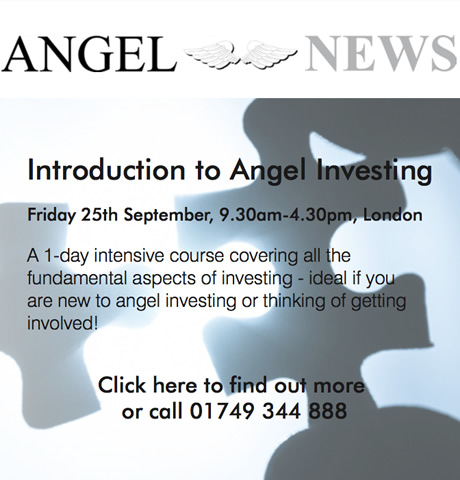So you want your money to make an impact?
Over the years when I have met investors, especially those about to enter the angel market, the conversation has typically started in one way. Nascent angels want to get involved in the industry for three reasons - to offer their skills to someone who could benefit from them, to use their money to back something that will have a blockbuster impact on the world and typcially third on the list is to make a shed load of money off some investments whilst accepting that the risks mean they will also lose their money entirely on some if not most of the investments they make.
The market speaks! We need to listen. For angel investing to be satisfying long term, it is vital that we ensure that we meet as many of an investor's objectives as possible. I wonder if, in the desire to help with the "Access to Finance" agenda and the fairly simple objective of trying to make investors some money, we are not missing a trick when it comes to the first two reasons investors cite.
In terms of offering skills to a company, we all know that by no means every investment an angel makes will be one where they can make a difference by being involved. Money from an angel should never be attached to the right to a board seat - though I think it is fair that, post investment, angels should be willing to be called upon for their contacts and entrepreneurs have an obligation to keep use them for this purpose alongside keeping them up to date about developments so that the angel/s will know if they can add value at some point.
When it comes to changing the world, there is a staggering correlation between commercial success and making the world a better place (and some of you may argue that there are times when commercial success has done an equal amount of damage!). When you look at which company in the last 50 years has had the biggest impact on humanity I would arguably put Google (and Alibaba) at the top of the list. For with access to knowledge and information comes the possibility of learning and advancement.
I think investors should bear some responsibility for the companies they back - especially if you are an individual with the three motives I mentioned above. If you are using your money to back something that could cause damage to humanity or to the world, in my mind, you are no angel - regardless of the short term financial success you may achieve. There will always be a grey area - what if your technological advancement will push people out of jobs for example? That need not be a bad thing, if you can see a way for those individuals to other work. Indeed if you are killling low grade, dirty jobs which cause people health problems and an early death, you might argue that you are helping them into a better life by forcing them to seek work elsewhere. Of course, if your money allows for technological advancement and creates better quality work for more people you arguably achieve archangel status!
Investors tell me that one of the biggest challenges that confronts them is how they put their money to good philanthropic use. Almost inevitably, they end up supporting particular causes they are interested in (often for personal reasons). And they don't just "donate" money; they give their time, their contacts and more - in fact they tend to act a bit like angels. If you get your philanthropic endeavours right, engaging in this type of activity is immensely satisfying - I believe that one of the areas angels most like to see is getting a charity or other endeavour onto a sound financial footing! There are even cases of where the right strategy and support has created money spinning opportunities for the charity concerned.
So its obvious really that the angel world, VCs, governments, charities, environmentalists and more have now woken up to the fact that adding a "Social Impact" agenda to the discussion about early stage investment is not only good for soft reasons - it also makes hard commercial sense.
The UK Government is doing its bit. It offers investors an opportunity to get tax breaks if they invest in "charitable" or "not for profit" endeavours through both Community Interest Tax Relief and the new (and exciting!) Social Investment Tax Relief. Charities and their ilk are beginning to recognise that to acheive a surplus which will sustain you and may even help you grow, you need to be commercially minded. Entrepreneurial founders from Bill Gates to the Innocent team have seen that there is no point in making money just for the sake of it - it only becomes satisfying when you know you have done good too - and importantly that one should be neutral on whether you try to "do good for others" from day 1 as in the case of Innocent or towards the last day - a la Mr and Mrs Gates. Energy companies are encouraging lower carbon innovation etc etc etc.
We are even seeing nascent interest from angels about the impact their money wil make. This is creating some very interesting thoughts indeed on topics such as return of capital vs return on capital and the increased profit potential from having an impact agenda within a red blooded commercial company. Here in the UK we have seen the increasing interest from major angels in our one social impact angel group ClearlySo Angels set up by the stellar Suzanne Biegel and run by her and Mike Mompi on a day to day basis.
On 5th November (Remember, Remember the 5th November - Impact investing the lot!) we are holding our first conference on all aspects of impact investing - from investing via the Social Stock Exchange in quoted businesses to angel investing to crowdfunding to working with CAF Venturesome. It's going to be an amazing day - whether or not the day ends with fireworks! I am looking forward to it because I have seen into the eyes of angels who invest in this world. They are intellectually and emotionally satisfied and this is not at the expense of their bank balances.
If you would like to come along, please do! You can find out more here: http://www.eventbrite.co.uk/e/simc2-tickets-12445227009
In Praise of the Scottish Contribution
With the Referendum decided, we are now entering a new era in the United Kingdom and it seems fitting to take the opportunity to celebrate the immense contribution that Scottish investors and entrepreneurs continue to make to the early stage investment world in our own united nations.
For generations Scottish entrepreneurs have contributed to the advancement of humanity - names pour out of my fingers as I type this - Carnegie, Graham Bell, Logie Baird et al. from history and in this generation we book our flights, hotels and cars through Skyscanner, travel around on Scottish born Stagecoach, and drink craft beer thanks to Brew Dog. Regardless of political persuasion, the Scottish business community helps to make the UK the place it is.
When it comes to the early stage investment world, I suspect many people are not fully aware of how influential Scottish individuals have been to creating our thriving investment community. We have the likes of David Graeme at Linc Scotland for leading the world, not just the UK, in models that make angel and early stage venture capital work in the 21st century. It is as a result of the thought and work of these individuals that we now can fairly say that angel investment is now a proper industry. The Angel Co-Fund in England is a direct descendant of the Scottish Co-Investment Fund and angel groups such as Archangels and Par Equity have led the way in delivering models whereby multiple angels can co-invest with a much needed degree of order and efficiency.
Venture Capital Trust fund managers which have their origins in Scotland, such as Amati and Maven, stand side by side with their English peers. Meanwhile fund managers bearing names such as Bruce (Pembroke), Fraser-Allen (Albion), MacDonald (Calculus), MacPherson (Octopus) and Ramsay (Puma) are scattered through the English based fund managers. And of course we must not forget the immense contribution the likes of lawyers such as Sandy Finlayson have made to the creation of angel syndicate structures.
It is also appropriate that we acknowledge the contribution of politicians with surnames such as Cameron and Blair for overseeing governments that have upheld and enhanced tax efficient investment schemes in this generation - ranging from the newbie Social Investment Tax Relief through the toddler SEIS and onto the EIS Scheme and VCTs.
As we debate how we will shape the creation of a more federal United Kingdom, I hope that neither entrepreneurs, investors nor politicians ensure that borders in our minds soften and that borders on maps dissolve when it comes to the movement of investment and entrepreneurship. And, in particular, this means thinking very carefully indeed about the effects of devolution on taxation.
Add a comment:
Call us on 01749 344 888
or click here to contact us







